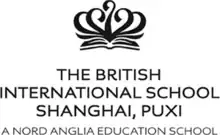The British International School Shanghai, Puxi Campus
The British International School Shanghai Puxi (Chinese: 上海英国学校浦西校区) is an international school in Minhang, Shanghai, China which opened in 2004.[1]
| The British International School Shanghai, Puxi Campus | |
|---|---|
 | |
| Address | |
111 Jinguang Road, Huacao Town Minhang District, Shanghai , China , 201107 | |
| Information | |
| School type | International School |
| Established | 2004 |
| Founder | Nord Anglia Education |
| Sister school | British International School Shanghai |
| Principal | Andrew Lancaster |
| Age | 2 years to 18 years |
| Website | The British International School Shanghai Puxi |
| The British International School Shanghai, Puxi Campus | |||||||
|---|---|---|---|---|---|---|---|
| Simplified Chinese | 上海英国学校浦西校区 | ||||||
| Traditional Chinese | 上海英國學校浦西校區 | ||||||
| |||||||
The British International School Shanghai Puxi follows the National Curriculum of England and Wales, the International General Certificate of Secondary Education and the IB Diploma Programme at a secondary level.
History
The school was founded in 2004[2] and is part of the Nord Anglia Education's group of schools. Nord Anglia Education owns and operates 43 international schools around the world in Asia, Europe, the Middle East and America.
Campus and location
The school began with one campus building in 2004 and a new secondary building was opened on a nearby site in 2008. This was followed by a new secondary campus, built alongside the original school building, which was opened in 2011 by Prince Andrew, Duke of York.
The campus is located in the Puxi side of Shanghai, in the Huacao area,[3] a expatriate residential area.
- Facilities include
- Classrooms for Early Years, primary and secondary students
- Music technology classrooms and recording studios
- Music practice rooms
- Primary and secondary science laboratories
- Black box drama studio
- Two theatres
- Primary and Secondary Learning Resource Centres (Libraries)
- 2 indoor gymnasiums
- Tennis courts
- 25-metre swimming pool in the secondary school
- Smaller primary school swimming pool
- Full size football pitch and athletics track turfed with astroturf
- Outdoor play area
Key stages and school structure
The school follows the British Key Stage System.
Extra-curricular activities
The school offers over after-school activities across the ECA and BISCAP (British International School Community Activity Programme) programmes.[4] The main difference between ECAs and BISCAPs is that BISCAPs are not free.
ECAs include a range of sport, dance, drama, science, gardening, exam revision, martial arts, a range of music groups and many more.
BISCAP is an additional programme which brings in external coaches[5] to run early morning, after school, evening and weekend sessions in music, sport, art and drama.
The school is also home to China Elite Tennis Academy (CETA) [6] who hold training sessions on campus.
Accreditations
The British International School Shanghai Puxi is accredited to offer the IB Diploma Programme (IBDP) and the International General Certificate of Secondary Education (IGSCE).
The school is also an accredited examination centre for the ABRSM, HSK, Cambridge International Examinations Centre (CIEC),
The school is accredited the Association of China and Mongolia International Schools (ACAMIS), the Council of British International Schools (COBIS),[7] Federation of British International Schools in Asia (FOBISIA),[8] EdExcel Examination Board, Shanghai International Schools association (SISA)
Community
The school has a Parent Teacher Association (PTA)[9] which organises social events during the school year including the annual Welcome Back Party, the Christmas Fair and the International Food Evening. They also have a New Parent Programme who organise events and information sessions for new families to the school.
The school's Room Parent network is a popular way for parents to get involved in school life, with one Room Parent responsible for one particular class. Room Parents provide information to the parents from the class teacher. They also help to organise volunteers needed for reading, as well as helping to arrange coffee mornings or other activities for parents to socialise and get to know one another.
References
- "BISS Puxi Website".
- "British Chamber".
- "Welcome to Huacao".
- "CETA".
- Selena Schleh (23 April 2012). "Children's sports in Shanghai". TimeOut.
- "CETA".
- "CETA".
- "CETA".
- "Parent Involvement".